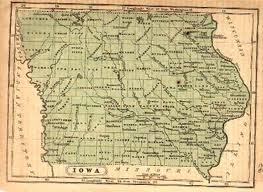Part 14
We detour onto I-35 south toward St. Louis. Cheryl scrambles for the map. About twenty miles later is our exit which Cheryl has ingeniously figured out in time for us to take. Route 92 runs parallel with I-80, our ribbboned home away from home. It is a quiet, snow-blown, two-lane path that stair-steps down in elevation as it rattles West towards Omaha. We pass through Winterset, birth place of John Wayne—and appropriately named on this icy day—then Greenfield, then Griswold on the Nishnabotna River where we stop for fuel. Ranchers and work men trundle by in air so cold it seems to crunch as one moves through it to the ubiquitous 7-Eleven-styled “Country Store.” Back in the car, waiting for Cheryl and the man-boy, a workman in seriously scuffed boots clambers into the diesel truck and inadvertently kicks a clear plastic water bottle out onto the snow-scudded platform. But neither the brush of it against his cold Levied leg nor the clunk of it to the ground—the diesel engine pulling under the hood—draws his attention and they drive off. The water will be frozen in no time.
Griswold lies at the western end of a series of terraced fields now vacant and forlorn, rimmed as they are with the shaggy mop of hair-like growth—flaxen-colored and stiff that tumbles over the edge. There is pleasure taken in the contours of this remarkably busy land (in an agri-way) the gun metal sky behind it the perfect complement to its heavy earthen load.
Griswold, quaint with old stores and civic buildings now lost, even here in rural America, to cyber-civic reality and the low grade comfort of home-bound televisions, is also very near the Mormon pioneer trail, a fact that is impossible to ignore as my brethren, ever industrious, have made sure, with the blessing of local historical societies, that the trail be clearly marked. Outside of this town, about five miles near present day Lewis, IA, my triple great grandfather John Lowe Butler and a Brother Cummings were sitting in a wicciup getting their asses saved by Wacakasuck, who, along with his Pottawatamie band, qualified with the Mormons as yet another refugee of the American people and their government. April in Iowa, apparently, wasn’t much better in 1845 than December is now in the Hawkeye State. The weather sucked—rain, hail and ice so thick that it coated trees and grass in seeming crystal. Complicated by Gramp’s “rumatism” (even in his 30s) the two “Mormonites” were not doing too well, wending their way through the grass and chasing a wild pony to replace John’s which had fallen and died earlier in their journey. The Indian led them to a small village where they were served baked cornbread, a wood duck (which gramps had shot en route) and strong coffee with maple syrup which, according to Cummings, the scribe in all this and with a thing for misspelled verbal intensifiers, “went verry well…a verry good breakfast.” After dining with the Pottawattamie village chief which Cummings made some effort to record was “a good looking fellow,” the not-so-bedraggled pair headed off on their journey, “feeling verry blessed.”
Before all of this, in Missouri where the Mormons had settled after leaving Ohio, Butler made his name by roughing up some locals in the town of Gallatin at a poll where his people were being dis-invited to vote. Pates were broken and Missourians scattered by the brawn and bravery of my 6 foot 2”, sturdily-built ancestor. It’s a story that is told with immense pride even today in family circles and Mormon history associations. We weren’t just the chosen people being driven out from state to state, our tails between our religious legs. No. Occasionally, we fought back, goddammit.
It’s hard to really know what Butler thought of all this, if he thought about it at all. I say that because as a relatively new convert to a new religion that was decidedly unpopular both on the frontier and in the nation’s capital, his decision to become a Latter -day Saint made early on in Kentucky with his wife Caroline had pretty much owned them from there on out. Having been essentially disowned by his wealthy plantation in-laws, he and Caroline didn’t have a lot of choice except to hitch their wagon, at times literally, to the Gospel according to Joseph Smith and later to the machinations of Smith’s successor, Brigham Young, and head the hell west. Along the way Gramps picked up seven more “wives,” including Caroline’s deaf-mute sister Charity and a mother and daughter with the last name of Lancaster who our faithful family histories stridently assure us was non-conjugal—something to do with making “proper” the taking of widowers and the abandoned on the trail to Zion under the care (and name) of a husband.
This is all very exhausting to me—this history of the great exodus of Mormon pioneers not so much from point A to point B but in ever-growing, overlapping and concentric circles looping west like a spring sprung, jettisoned out then recoiling, moving forward but only from a birds-eye view or the galactic perspective of a god. And John Lowe Butler was no exception, in fact in many ways he was the poster child of westward ho alternating with westward ho-hum. For nearly two and a half years after leaving Nauvoo, the man who was a personal body guard first of Joseph Smith and then Young, was sent on wild errands, mostly to corral the scattered Latter-day Saints into organized companies that would eventually all end up at the Great Salt Lake. In the migration of 6,000 (?) first-wave Mormons over grasslands and mountains that had little if no trail to follow and precious little provenance for the oxen that pulled those wagons, a vanguard was needed to pave the way. They were tasked with growing and cultivating crops that would later be harvested by those to come. It was a vast cooperative unlike those bee-lining along the Oregon trail in solitary bands, not bound spiritually to a collective burned from within by a religious quest.
So Gramps was sent by Brother Brigham to criss-cross the Iowa territory, bringing messages, reading letters, fording rivers and eating boiled corn and roast duck the size of quail. His journey du jour near where we currently are, just off I-80, was designed to reclaim in South Dakota a renegade band of his brethren led by the freethinking James Emmett who, earlier, had been the very man to baptize the Butlers Mormon in Kentucky. So while the first company left for what would become Utah, Grandpa stayed behind. Even when the second train left the following spring he was asked to stay on at Winter Quarters, a gathering place on the bluffs of the Missouri near present-day Omaha of transient pioneers readying for the trek. Brigham had this curious, persistent sense of privilege among the people he was leading. (He actually used to charge the saints a toll in Salt Lake City for even new arrivals to cross through his land to City Creek.) Still it seems particularly galling that the Young would tell Grandpa, who was a blacksmith by trade but, as is clear in the histories, the prophet’s unquestioning loyal gopher, “Oh…looks like you and your family really aren’t ready to be going west here, dude. Looks like you need to stick around in western Iowa and get your shit together. Maybe shoe a few horses. Oh, and you know that shirt you’ve been wearing for five years? Maybe it’s time to get a new one. See ya ‘round campus.”
Did Grandpa ever think of throwing it all over and going back to his in-law’s plantation, slaves and all? Or return to somewhere at least slightly more comfortable than a wicciup or a sodden home in a settlement on the Missouri with the discomfiting name of “Winter Quarters”? Finally, when he had the chance to leave the heartland, was he tempted by Ft. Bridger at the foothills of the Uinta Mountains, tempted to just gun for California instead of the Great Basin? Had he done so, I would probably be obsessed with something other than a quaint religious movement that nevertheless still has a stubborn hold on me.
Today, as with the country of my birth, Mormonism feels like a colossal failure to me—a journey out of moribund frontier religion via the ecstasy of a mystic to another moribund faith 180 years later via industrialized dogma. To wit: we became the very thing we thought we were fleeing when we left the mid-west—intolerant, moralistic, suffering from a surfeit of Victorian mores. Now, the best we can muster on the national scene as the pinnacle of who we’ve become is a carefully coiffed GOP presidential candidate with a first name at least as weird as “Barack,” if not weirder.
And yet despite this bile that lapsed Mormons like me can’t seem to rid themselves of, I am moved as we approach Council Bluffs overlooking the mighty Missouri and I ponder anew what the Almighty can do, to quote from the hymn. Or what something seemingly almighty did. There in the river bottoms now cluttered with interstate exchanges sits a history that defined a people, a land and generations that followed. John Lowe Butler believed in something bigger than himself and in a country that despite shitting on his people he nevertheless believed was a promised land where God’s kingdom would be established. And, truthfully, there was a socialistic impulse deep in his bones and those he aided west that identified more with the trodden down Native Americans, who Mormons considered Hebrew descendants, than with the eastern establishment.
And yet despite this bile that lapsed Mormons like me can’t seem to rid themselves of, I am moved as we approach Council Bluffs overlooking the mighty Missouri and I ponder anew what the Almighty can do, to quote from the hymn. Or what something seemingly almighty did. There in the river bottoms now cluttered with interstate exchanges sits a history that defined a people, a land and generations that followed. John Lowe Butler believed in something bigger than himself and in a country that despite shitting on his people he nevertheless believed was a promised land where God’s kingdom would be established. And, truthfully, there was a socialistic impulse deep in his bones and those he aided west that identified more with the trodden down Native Americans, who Mormons considered Hebrew descendants, than with the eastern establishment.
At the time, ours was an oppositional stance to a promised land of liberty that could not keep its promise to everyone. (Some things never change.) “We want to take you to a land where a white man’s foot never trod,” the people were told by one of many they esteemed as a prophet and apostle. Why? Because “we are not accounted as white people and I don’t want to live with the white people.” And so we were not accounted and not in the parlance of the royal “we,” but in the parlance of belonging to a group that seems in many ways to be ethnic.
And so it came to pass, that “we” put our money where our mouth was. We gave the finger to the East, shouted “damn the torpedoes,” married as many times as we were commanded, crossed the Missouri, survived the Sweetwater in the high plains of Wyoming…made the desert “blossom as a rose.” ….Mid-wifed George Romney and his son Mitt several generations later.

